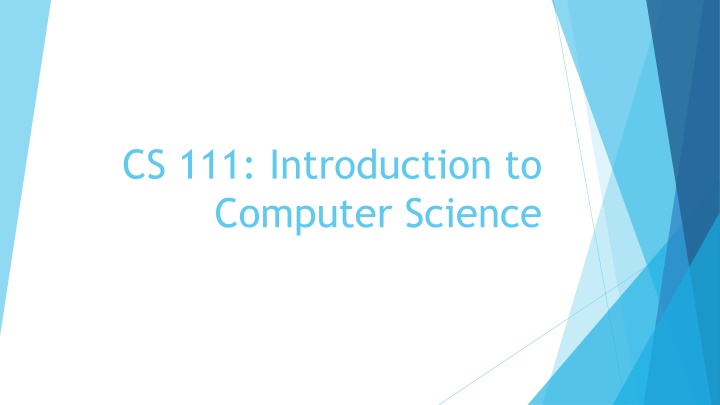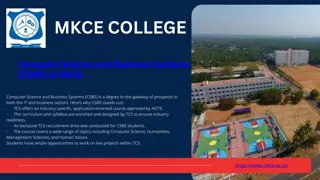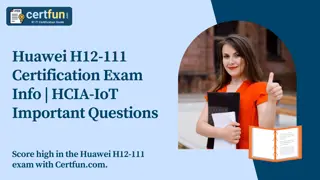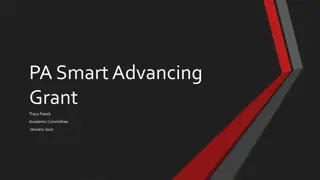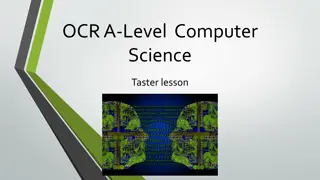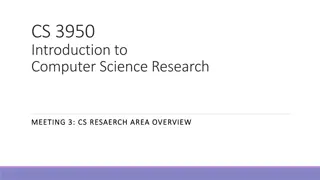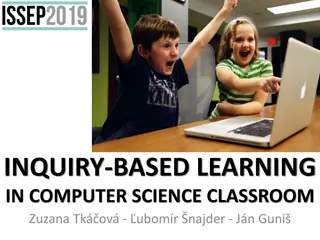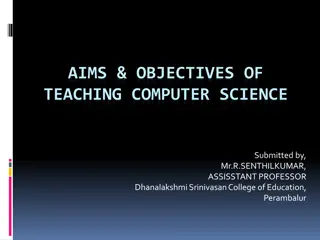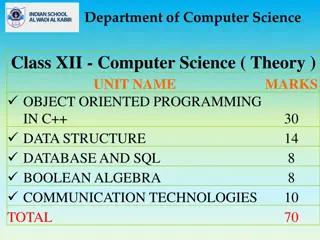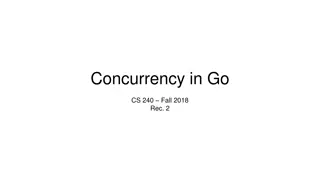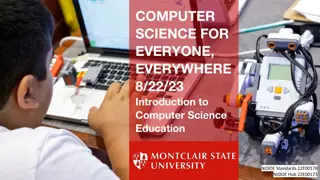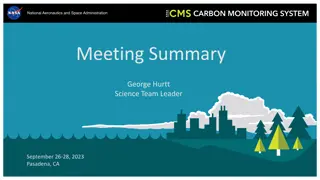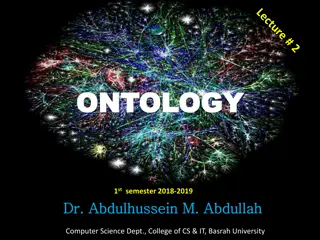Dive into the World of Computer Science: CS 111 Introduction
Explore the fascinating realm of computer science through CS 111. Discover the various aspects of computer science, from problem-solving techniques to complex programming concepts. Unveil the origins of the course and the rigorous topics it covers, including managing program complexity, programming with Python, language interpretation, web technologies, and software design. Get a glimpse of the prerequisites needed to excel in this challenging but rewarding course.
Download Presentation

Please find below an Image/Link to download the presentation.
The content on the website is provided AS IS for your information and personal use only. It may not be sold, licensed, or shared on other websites without obtaining consent from the author.If you encounter any issues during the download, it is possible that the publisher has removed the file from their server.
You are allowed to download the files provided on this website for personal or commercial use, subject to the condition that they are used lawfully. All files are the property of their respective owners.
The content on the website is provided AS IS for your information and personal use only. It may not be sold, licensed, or shared on other websites without obtaining consent from the author.
E N D
Presentation Transcript
CS 111: Introduction to Computer Science
A Very Brief Introduction to Computer Science
What is Computer Science? What problems can be solved using computing The study of How to solve these problems What techniques lead to effective solutions Systems Graphics Security Decision Making Robotics Ethics & Safety Natural Language Processing Answering Questions Translation Artificial Intelligence Networking Programming Languages Theory Scientific Computing Human Computer Interaction
Course Origin We borrowed and adapted an initial version of this course from UC Berkely s CS61a course with their permission and help. After teaching that course for a year, we decided it wasn t quite meeting the needs of our students in our program We ve been redesigning it since the end Winter Semester. We piloted the new version in Summer and taught it to 500+ students in Fall Some of the assignments are still under development Bear with us as we make changes and adapt
Course topics Managing complexity in programs (procedural abstractions, data abstractions, programming paradigms) Deep understanding of programming concepts (using Python) How computers interpret computer programs Different types of languages (Python, Regex, Calculator, HTML) Problem solving techniques (both iterative and recursive approaches) HTML, HTTP, & the web Plotting Software design and testing This course is challenging and often mind-blowing!
Course Prerequisites This is not an introductory programming class. You should have prior coding experience with branching, loops, and functions. If you do not think you have enough programming experience, consider taking CS 110 and joining us next term.
Course Components Lectures Labs Homework assignments Projects Exams Supplemental Textbook (composingprograms.com) Office hours Everything is linked from the class website: https://cs111.byu.edu
Weekly Schedule Monday Tuesday Wednesday Thursday Friday Saturday Lecture Lecture Lecture Lab Section Lab Section Homework/ Project assignments typically due
Lab Sections Make sure you are signed up for a Lab section (005-015) as well as the lecture. Each lab section has a pair of TAs that will lead the activities in those sections. You ll have the same TAs all semester. Labs will focus on small coding challenges that provide practice with materials covered in lecture They are a place to Take chances, make mistakes, and get messy! Miss Frizzle. Attendance is not required, but STRONGLY encouraged. If you attend and participate, you get full credit. If you don t, you have to submit working code to the auto-grader by the end of the day.
Homeworks & Projects Homework and Projects are usually due on Friday nights. See the course website for exact due dates. Start early, code often! These often build on and use code from your labs and previous homework assignments. The course moves fairly fast. Start early! The earlier you find you need help, the better! You can discuss the assignments at a high-level, but don't copy anyone else's code (unless it's your project partner).
Exams Midterm 1: Tuesday, Feb 20 Thursday, Feb 22 Midterm 2: Monday, Mar 25 Wednesday, Mar 27 Final Exam: finals week (Apr 19-24) All exams are scheduled to be held in the Testing Center. Tests are all on paper, multiple choice, with a page or two of notes but no electronics allowed.
Getting Help Post questions on the class Discord (invite link: https://discord.gg/3aCYJDqPJn) Visit the TA lab (1121 TMCB) Use the help queue: https://students.cs.byu.edu/~cs111ta/helpqueue/ Come see your professor. Check out our contact page for how to get in touch https://cs111.byu.edu/staff/#contact/).
TAs We have an awesome group of TAs information about them. . See the course website for The TAs are regularly available five days per week in the help lab at TMCB 1121. Check the schedule at https://cs111.byu.edu/staff/#ta- lab.
Course Policies Read the syllabus. You are responsible for knowing the information there (https://cs111.byu.edu/articles/about/).
Collaboration Asking questions is highly encouraged Discuss everything with each other; learn from each other! Some projects can be completed with a partner Choose a partner from your lab section The limits of collaboration Please don t look at someone else's code! Exceptions: lab, your project partner, or after you already solved the problem Please don't tell other people the answers! You can point them to what is wrong and describe how to fix it, but don't tell them what to type, and don't type for them Copying project solutions causes people to fail the course We really do catch people who violate the rules, and we're getting better at it. (? )
Community Guidelines Your goal should be to learn and help others learn. Even if everyone here has programming experience, there is still a wide range of experience levels. All are welcome! There are no "stupid" questions. Ask all your questions and welcome everyone else's questions.
Using Large Language Models (ChatGPT and the like) These can be quite useful for helping you to understand a topic and to answer specific questions. On the class Discord server you can ask questions in the Duck Pond channel. The rubber duck is powered by ChatGPT and is designed to be a "Virtual TA" to help you with concept questions You should NOT be asking LLMs to give you code for your assignments. They will happily do so, but We expect you to write the code yourself. The code from the LLMs is often wrong. When you go to get help from the TAs, the first thing they will do is ask you to explain your code and what it is doing.
